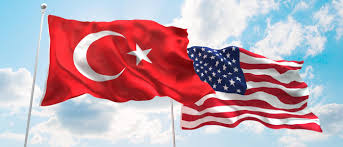Relations with the west and the USA in the struggle for Turkey’s NATO continued intensively. Especially at the time of the Eisenhower administration, some changes in USA policies are in this intensity. Eisenhower Doctrine to Turkey and he made with serious economic and military aid to the geography of a number of measures were taken against the USSR expansion. Acording to Hale one of the block to the USSR stroke to the Middle East to the western side of Turkey and Eisenhower could provide considerable assistance to Turkey thinking about it. However, the prime minister Adnan Menderes in Turkey expressed that it might be a leader for NATO in the Middle East and he was beholding the western move in line with the attitude of the US side. But this attitude is strongly welcomed by Middle Eastern states and western Turkey and USA made him think what he wants. Secondly, in May 1953, a new search was launched with the visit of US Secretary of State John Foster Dulles to Middle Eastern countries. As a result, Turkey’s mission to take on the Middle East, the United States signed the Baghdad Pact, dated February 24, 1953 in which. This led to tense relations between Turkey and the Middle East. Arab states, led by Egypt and Syria, responded in response to this pact. These countries, which saw the pact as an instrument of Western imperialism and an organization serving Israel, signed defense agreements among themselves in response. The Baghdad Pact not only affected Turkish-Arab relations, but also further strained the cold relations with the Soviet Union. Continued Turkey’s recognition of Israel in that year and again strained relations with the Middle Eastern country with her attitude. With the coup at At the conclusion Nuri, the Pact’s troops began to withdraw and the pact ended in 1959.
Firstly, After the May 27 coup, it was envisaged that relations with the Middle East would be developed in the new government’s 11 July 1960 program. Subsequently, the AP(Justice Party), which came to power in the 1965 elections, was trying to establish stronger foundations. Secondly continued towards the 1970s, a series of wars broke out in the Middle East and the embargo of OPEC countries had begun. Turkey has further increased its dependence on Middle Eastern countries with rising oil prices. Turkey had to change its image from past years and thus made it. In the 1967 Arab-Israeli war, the AP did not open its war bases to the USA, and according to William Hale, the AP attempted to correct this attitude, which was created by Menderes. Again, Süleyman Demirel closed the Incirlik Base in the Battle of Youm Kippur in 1973. To sum up, in the shadow of them trying to adopt a neutral stance Turkey was trying to show that the western side of the image was once the Middle East countries. As a matter of fact, the relationship of Palestine Liberation Organization and Yasser Arafat with Demirel province in 1970 and the offices opened to Ankara showed this.
Towards the end, Turkey has continued even in the fact that Iran-Iraq war to maintain its neutrality. Because the transitions experienced during the war was providing a huge economic benefits for Turkey. (Especially with Yumurtalık and Kerkuk pipelines). On the other side, there have been some disputes as a result of the objections and friction that has been going on since the 1939 Hatay issue, which is Syria. However, even though they want to be resolved through a number of agreements and cooperation, the PKK attitude of Syria has overshadowed them. At the conclusion, Turkey’s western and pro-US stance towards the end of 1950, which was shaded our relations with the Middle East. Indeed, after the military coup at the 1960 in the interests of Turkey and lived with the change of government has tried to clean the oil crisis that image and try to get out of this crisis with the least damage inside. Towards the Özal era, it tried to further expand its mission in the Middle East and tried to solve the water problem in the region, while maintaining its status as the great state in the region.

